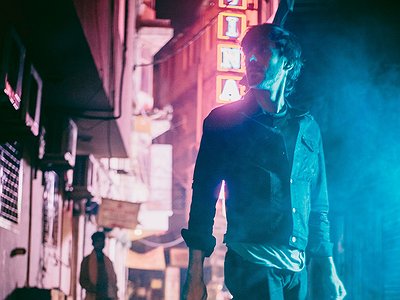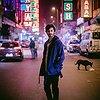Part 1
Name: Dualist Inquiry / Sahej Bakshi
Nationality: Indian
Occupation: Producer, guitarist
Current Release: Life Forms EP.
Recommendations: 1) The Triptych - Dustin Yellin: Dustin Yellin is a Brooklyn-based artist who works with 3-dimensional photomontages to create frozen, suspended scenes that are visually beautiful and layered with complexity.
2) Dani Shapiro - Still Writing: Dani Shapiro is a writer who wrote this book about writing and being creative. She reflects upon her decades of experience as a writer and is able to break down the process of creativity into relatable and practical terms without losing sight of its abstract and mystical aspects. Reading this book was a game changing moment for me - I highly recommend it to anyone who values or is interested in creativity.
If this interview inspired you to find out more about Dualist Inquiry, visit his facebook profile for more information, tour dates and his release schedule.
When did you start writing/producing music - and what or who were your early passions and influences? What is about music and/or sound that drew you to it?
I started writing music at the age of 13, a few years after I started learning to play the guitar. My best friend and I decided to start a band in 8th grade, when we were 14 and were studying at the same boarding school. At the time, we were listening to a bunch of 90s and early 00s alternative rock bands like Rage Against the Machine, Nirvana, Green Day, Blink 182 and the likes. We loved playing songs with loud guitars and slamming drums - our poor little school speaker system couldn’t handle it and gave us all sorts of nasty, unintended distortion that we didn’t mind at all.
Learning to play an instrument at that age was such a formative experience - it really became a part of who I was and how I identified myself in my world. That’s what drew me into it and kept me coming back from more. In this boarding school where everyone wore the same uniform and it was hard to stand out, being a guitarist gave me that way to define myself.
For most artists, originality is first preceded by a phase of learning and, often, emulating others. What was this like for you? How would you describe your own development as an artist and the transition towards your own voice? What is the relationship between copying, learning and your own creativity?
I spent many years playing covers on the guitar, and that was when the foundation of my musicality was formed. I completely agree that originality is preceded by emulation - the first few songs I wrote sounded very much like the bands I was into at the time. That didn’t bother me one bit - as far as I was concerned I had learned to play the guitar so I could play my heroes’ songs myself.
The transition to having an original sound was a slow process. There came a time when all the influences and idols’ sounds had settled into my subconscious mind, and I was able to write from my own perspective. It’s worth mentioning I was still a teenager at this point and hadn’t in my wildest dreams imagined that I’d actually be making a living off my own music one day. I started to actually think about music as a full-time pursuit only in my early twenties, when I discovered electronic music. I started combining the world of digital synths and production with guitar and acoustic instruments, and that’s when my own sound emerged in its current form.
I think there’s a thin line between inspiration and copying, or plagiarism. After all, there are only 12 notes in the musical scale, and it’s virtually impossible to come up with a chord or note combination that has never been played before. Invariably, any idea will have its roots in one’s past - the key is to take that idea and make it your own. But still, there are times I’ll write a new song only to realise that sounds too similar to something I’ve heard before. Those songs end up never seeing the light of day.
What were your main compositional- and production-challenges in the beginning and how have they changed over time?
One of the most frustrating things about learning music production is not knowing how to create the sounds you’re imagining in your head. It’s also hard to make your tracks sound good, as mixing many tracks of audio into a cohesive master track is way harder than it looks. Those challenges were honestly the easy ones for me, because the answers to technical questions are definitive and easy to find online.
Once I had learned production, I started to experience good writing days when ideas flow freely and bad writing days, when I’d be unable to create even a single bar of music. Over time, I’ve learned to work with myself first and foremost. Now that production skills aren’t an issue, the whole game is between me and myself - where I have to gently but consistently try to get myself into a headspace where I’m able to access my ideas freely. It’s also a challenge to stay vulnerable and open to experimentation when you have a history of releases and an established “sound” that everyone recognises. It can be a bit limiting, so I try not to think too much about my past releases and just look forward while writing.
What was your first studio like? How and for what reasons has your set-up evolved over the years and what are currently some of the most important pieces of gear for you?
My first studio was basically an old PC laptop, a pair of Logitech computer speakers and an M-Audio MIDI controller. At the time, I was just so happy to be producing music that it hardly mattered that I couldn’t even monitor my mixes properly. I kept adding new pieces of gear to the studio, and it’s evolved into a really fun and hands-on setup that has changed the way I make music. Now, I have 5-6 analogue synths (Moog Sub 37, Nord Lead A1, Dave Smiths Prophet 12, Access Virus, Korg Minilogue XD), 2 drum machines, A Roli seaboard, Ableton Push, Native Instruments Maschine and a 22-channel Soundcraft mixer to tie it all together.
I end up using hardware for most synth sounds because I like committing to the part early on and working with audio, rather than MIDI. I don’t use automation to modulate the hardware, so the process of recording each synth part is a performance in itself. I also use the Fractal Audio Axe FX 2 for my guitar parts, along with some effect’s pedals, of which my favourite is the Strymon Big Sky Reverb. Again, I used to record the guitar dry and use digital effects earlier but now I prefer to commit to the fully wet sound from the pedals. It helps me move forward in the writing process.
How do you make use of technology? In terms of the feedback mechanism between technology and creativity, what do humans excel at, what do machines excel at?
Technology has been a core part of my process since the start of my music making career. Initially, I thought Dualist Inquiry was going to be a band, but when I discovered the ability to layer and compose different instruments electronically, it enabled me to make it a solo project. In 2019, technology has come a really long way, even if you just look at audio plugins and vsts. I’m constantly amazed by dynamic, intelligent plugins such as Trackspacer or Izotope Neutron that are able to make micro-adjustments several hundred times a second to the compression and EQ and can also speak to other tracks to help two clashing layers sit well together. Often times, I’ll use randomise features in plugins such as Native Instruments Reaktor or Buffer Shuffler to create unexpected melodies that a human mind wouldn’t come up with.
At the end of the day though, I think technology and AI is still a long way from being able to create “music” that appeals to us humans. There’s the non-scientific, artistic element that separates humans from machines - I think it’s still necessary for a human to be present to put all the pieces together in a way that makes sense to us.
Production tools, from instruments to complex software environments, contribute to the compositional process. How does this manifest itself in your work? Can you describe the co-authorship between yourself and your tools?
To me, every software or program is a potential instrument that has its own unique characteristics much like a piano or guitar. Being an electronic musician is very much about interacting with these programs and coaxing out something that is emotionally moving. There are times I exert complete control over digital tools, programming every last bit to my exact specifications, and there are other times I allow the software to do things that weren’t my idea. I see myself as the conductor, or facilitator of these tools - the idea is to manage them and herd them in a way that the end result is music that’s pleasing to listen to.






